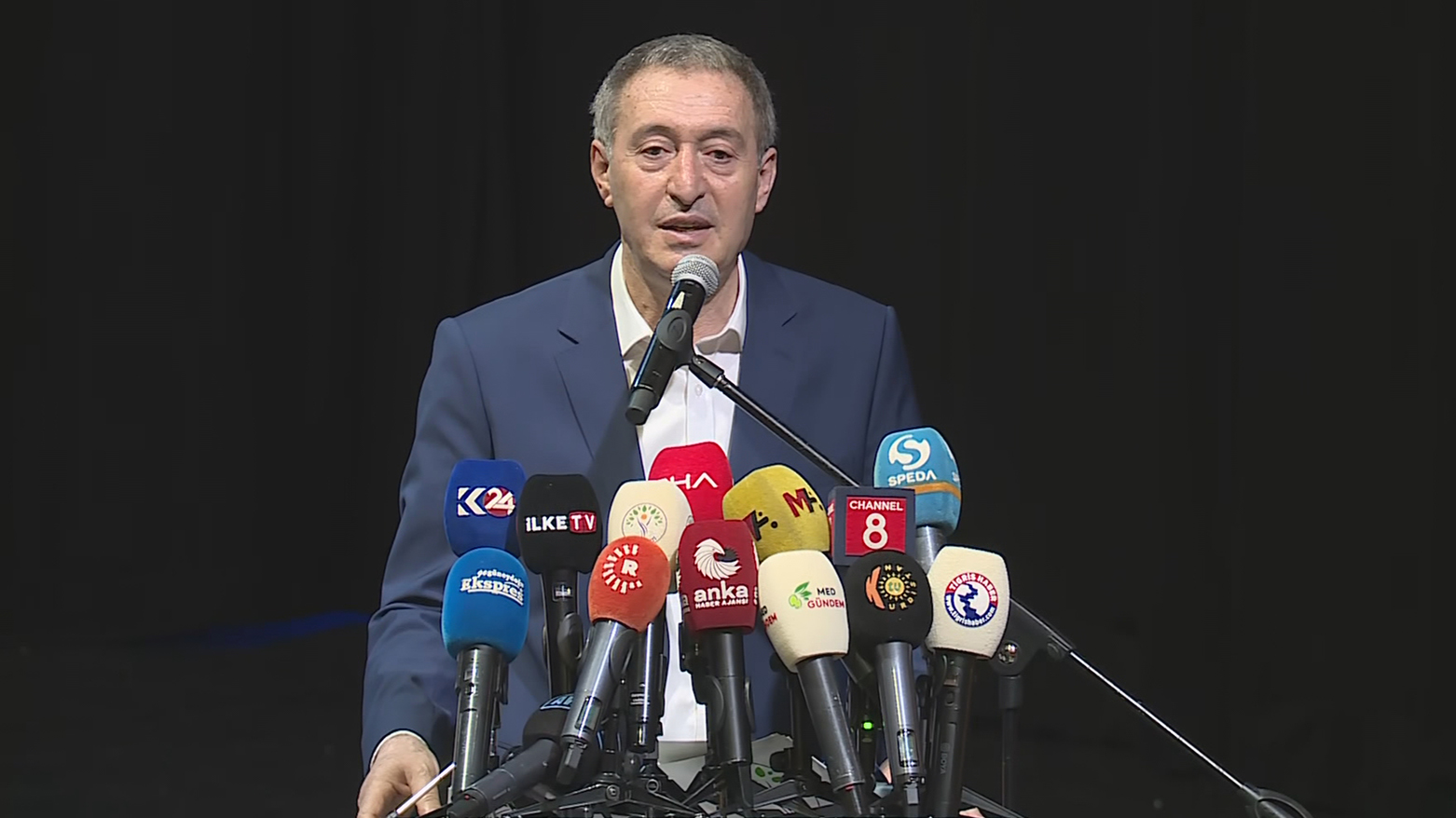DEM Party: Path to Peace Begins with Restoring Elected Kurdish Municipalities
DEM Party Co-chair Tuncer Bakirhan stated restoring elected Kurdish municipalities and ending state-appointed trustees is essential for peace. He emphasized releasing detainees and called for constitutional reforms to ensure democratic integration.

ERBIL (Kurdistan24) – The Co-Chair of Türkiye’s DEM Party, Tuncer Bakirhan, said on Friday that the path toward a sustainable peace process begins with restoring elected municipal administrations and ending the practice of trusteeship, stressing that the will of the people must be returned without delay.
Speaking at a gathering of DEM Party mayors on 14 Mijdar, Bakirhan highlighted the significance of the initiative launched by PKK leader Abdullah Öcalan and said the process places a “great responsibility” on all local administrations.
“In the Peace and Democratic Society Process, a major responsibility falls on your shoulders,” he told the mayors. “You are advancing the struggle for grassroots democracy, and that is why this process concerns you directly. Peace means active and democratic self-administration.”
Bakirhan underscored that the practice of appointing state trustees must end permanently.
“We must no longer hear the word ‘trustee’,” he said, adding that the elected will of the people must govern not only Kurdish-majority municipalities but “across all of Türkiye.”
He also emphasized that one of the central expectations in society is the release of detainees, describing it as a key demand that must be addressed early in the process. Bakirhan called on mayors to serve with responsibility, deliver genuine services, and strengthen community engagement to ensure “a major success.”
The debate over the Kurdish question in Türkiye continues to intensify, with growing expectations for legal steps to accompany political dialogue. Calls from within the country’s political and civil society circles have increasingly focused on democratic integration and constitutional reforms.
Juliana Gozen of the Civil Freedom Party argued that Türkiye’s Kurdish question cannot be separated from the country’s broader democratization process. She noted that while some legal experts argue that members of the PKK and those associated with it require specific legal arrangements, the foundation of any solution must remain grounded in civil society.
Gozen warned that if the process does not rest on a strong societal basis, it will not succeed. She emphasized that Kurdish society had already paid “heavy sacrifices over many years,” and that the new phase must be approached with seriousness and shared responsibility.
“This process is the result of the great sacrifices of the Kurdish people,” she said. “It must move to a new stage. This is a joint responsibility, because the Kurdish question cannot be separated from Türkiye’s democratization. Kurds in Amed and Türkiye’s workers must come together to build a solid social foundation. If we do not do this, the process the government calls ‘a terror-free Türkiye’ may be driven into a dead end, and we will also lose our achievements.”
The long-running discussions on a democratic solution to the Kurdish question—ongoing for more than a year inside Türkiye—continue to dominate public and political debate. With the PKK having announced its steps, attention has now turned to parliament, where observers are watching whether legal measures will follow.
Professor Dr. Levent Koker told Kurdistan24 that democratic integration requires more than political dialogue and must include constitutional and legal steps.
“The required steps are the correct implementation of the Constitution and the law,” he said. “For example, ensuring the execution of court rulings and ending the trustee system with an administrative decision. This is part of what is meant by democratic integration.”
He added that non-legal issues such as “ties and associations” that have been used to justify actions outside the rule of law must also be addressed. Koker stressed the need for a special legal framework enabling individuals involved in the process to participate freely in democratic political life.
“The aim is to quickly establish a legal and democratic basis,” he said, adding that public confidence in the process will grow only when people believe that “Turks and Kurds can live together under the same state, or make an electoral choice within this framework.”
This week, the Parliamentary Commission on National Unity, Brotherhood, and Democracy was expected to discuss a visit to İmralı Island and the launch of legal steps as part of its 17th meeting. However, the session was postponed following the crash of a Turkish military helicopter on the Georgia–Azerbaijan border, which killed 20 Turkish soldiers.
Despite the postponement, political and legal figures from Southeast Türkiye (Northern Kurdistan) continue urging Ankara to advance legal steps cautiously and prevent the process from being derailed by provocations.
Kurdish politicians and jurists insist that the new phase must be grounded in legal safeguards to avoid manipulation or disruption. DEM Party parliamentarians argue that it is time for Kurds to see themselves fully included within Türkiye’s legal framework.
Serhat Eren, DEM MP for Diyarbakir, told Kurdistan24:
“For 100 years, Kurds have been outside the law. Kurds want to enter the legal framework. The Kurdish language is not recognized; their identity is not recognized. Kurds say they have laid down their arms and are waiting for steps that will allow them to re-enter the law.”
Legal expert Enes Akdemir likewise emphasized the importance of administrative and legal steps.
“Legal measures must be taken, administrative steps must be taken,” he said. “The longer this process is delayed, the greater the risk that provocations may occur. This process must not suffer damage. It is very important for both Kurds and Turks.”
Experts and politicians stress that international developments and tensions in the Middle East heighten the need for swift legal progress to ensure the stability and safety of the process.